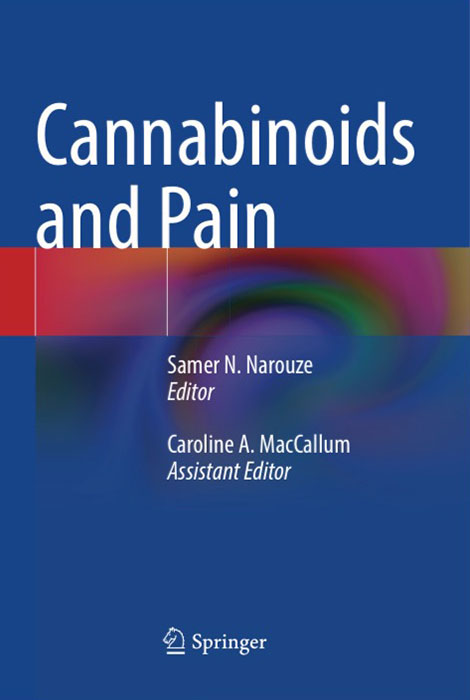Chapter 27: Cannabinoids as a Substitute for Opioids: Basic Science and Clinical Evidence
Authors: MacCallum CA, Eadie L, de Freitas L & Narouze SN
Abstract:
Opioid overdose (illicit, prescription, nonmedical prescription) is the leading cause of accidental death in the United States. Alternative analgesics are warranted among chronic pain patients given the associated comorbidity and morality related to the long-term use of opioids. Public and professional interest has increased regarding how cannabis may curb the opioid epidemic.
In contrast to opioids, patients do not develop tolerance to the therapeutic benefits of cannabis (only to the psychoactive effects) and report a superior side effect profile with cannabinoids, with no reported fatalities directly due to overdose. The adjunctive use of cannabis with opioids has been investigated to reduce opioid doses among chronic pain patients receiving high doses of opioids (90 mg morphine equivalent dose). Preclinical evidence suggests a reciprocal interaction between the endocannabinoid and opioid systems and synergistic interactions between cannabinoid and opioid analgesics. Observational and epidemiological evidence is conflicting regarding the relationship between recent enactment of medical marijuana laws and subsequent opioid-related harms and may be confounded by alternate factors. Data from clinical trials, systematic reviews, and meta-analyses have demonstrated a moderate level of evidence for the use of medical cannabis compared to placebo in chronic pain and neuropathic pain specifically in reducing overall pain, pain intensity, and associated factors (i.e., anxiety, insomnia). Clinical evidence has also pointed to improved analgesia and decreased opioid-related harms with the use of low-dose adjunctive THC concomitantly with reduced doses of opioids, known as Cannabis-Opioid Mutual Potentiation. Small doses of opioids in combination with cannabinoids may provide an alternate method of treating refractory or complex pain while overcoming the undesirable effects of opioids and psychotropic effects of cannabinoids. Further research is warranted to clarify this relationship further.

